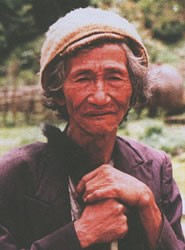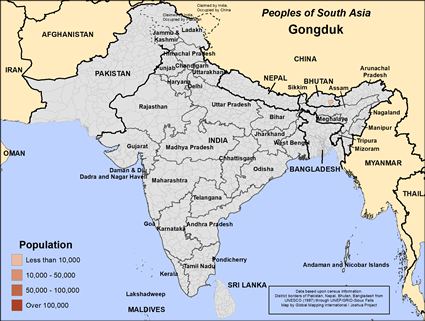Gongduk in Bhutan

Photo Source:
Copyrighted © 2026
Peoples of the Buddhist World, Asia Harvest All rights reserved. Used with permission |

Map Source:
People Group data: Omid. Map geography: UNESCO / GMI. Map Design: Joshua Project
|
| People Name: | Gongduk |
| Country: | Bhutan |
| 10/40 Window: | Yes |
| Population: | 2,500 |
| World Population: | 2,500 |
| Primary Language: | Gongduk |
| Primary Religion: | Buddhism |
| Christian Adherents: | 0.00 % |
| Evangelicals: | 0.00 % |
| Scripture: | Translation Started |
| Ministry Resources: | No |
| Jesus Film: | No |
| Audio Recordings: | No |
| People Cluster: | South Asia Buddhist |
| Affinity Bloc: | South Asian Peoples |
| Progress Level: |
|
Introduction / History
Gongduk people live in a few extremely isolated villages in Bhutan's Mongar District. Nothing was known about this small ethnic group until the Dutch linguist George van Driem discovered them in 1991. Van Driem wrote, 'The Gongduk language is spoken by a dwindling population in a remote enclave along the Kurichu [River] in east-central Bhutan.... In May of 1991, I discovered this previously unknown language in a remote portion of Mongar District, where I was conducting a linguistic survey of the country in the serve of the Royal Government of Bhutan.... Gongduk can be reached on foot from Jepzh 'ing, from which it is two or three days' journey to the south. It is also about a two days' journey up from the Manas River in the plains. This accounts for the fact that the Gongduk have remained largely unknown outside of the Gongduk area itself and its immediate environs. '
As van Driem studied Gongduk, he excitedly realized that he had found a unique language that appears to be the sole representative of a branch of the Tibeto- Burman family. Another source has said that Gongduk 'retains the complex verbal agreement system of Proto Tibeto-Burman. It is said to belong to one of the ancient populations of Bhutan.' Part of the reason the Gongduk remained undiscovered for so long is because the people pass themselves off as Kheng when they meet outsiders. Just why they do this is uncertain, as they have their own unique culture and language that is not mutually intelligible with Kheng. Van Driem further notes, 'There are currently just over a thousand speakers of the Gongduk language. According to one legend Gongduk was once long ago a small independent kingdom. The Gongduk themselves repeat that they are of aboriginal Dung lineage, or Dungjüt, and that their ancestors were semi-nomadic hunters.' In these respects, they are similar to the Lhokpu people of Bhutan.
One must wonder how many other small tribes and language groups exist in the hundreds of isolated valleys of the Himalayan Range. The Gongduk may have been one of the earliest people groups in Bhutan, but for uncertain historical reasons they were driven to their present location centuries ago. Bhutan was completely closed off to outside influence for centuries until 1960, when the king allowed more freedom.
What Are Their Lives Like?
Little has changed in rural areas of the nation for centuries. When the Earl of Ronaldshay entered Bhutan in 1921 he reported, 'With our passage through the bridge, behold a curious transformation. For just as Alice, when she walked through the looking-glass, found herself in a new and whimsical world, so we found ourselves, as though caught up in some magic time machine fitted fantastically with a reverse, flung back across the centuries into the feudalism of a mediaeval age. '
What Are Their Beliefs?
The religious belief of the Gongduk is Tibetan Buddhism mixed with animistic spirit worship. Throughout two thousand years of Christianity, the good news that Jesus Christ died for the sins of the world has never once entered the remote enclave inhabited by the Gongduk.
What Are Their Needs?
The Gongduk people need all kinds of infrastructure improvements. They need modern hospitals and schools.
Prayer Points
Pray for the Gongduk people to have hearts that are open to the abundant blessings of Jesus Christ.
Pray for their families to prosper financially and spiritually as they experience a relationship with Jesus Christ.
Pray for a disciple-making movement among the Gongduk that will spread joy, peace and salvation to other peoples in Bhutan.